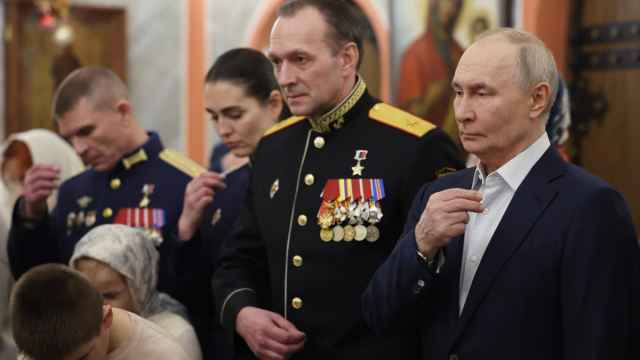MARRAKESH, Morocco — The New START nuclear arms treaty between Russia and the United States could collapse unless Washington ratifies it before next month's elections change the Senate's composition, a senior State Duma deputy said.
Konstantin Kosachev, head of the Duma's International Affairs Committee, said he remained hopeful that the Senate could ratify the treaty in the so-called lame duck session, when it reconvenes after the Nov. 2 congressional elections but before newly elected senators take up their seats.
"If for whatever reason — political, technical — that does not happen … then I think the agreement will have problems from the point of view of ratification, very big problems," Kosachev said late Saturday on the sidelines of the World Policy Conference in Morocco.
Kosachev said if Republicans made big gains in the Senate in next month's election, as many opinion polls suggest, it would not be possible to garner the two-thirds vote needed to ratify the new treaty.
"Many will be in principle against agreeing on anything with Russia. In that case we will have to start from scratch. That is the worst-case scenario — completely awful. For now, I do not want to believe in it," he said.
Some Republican senators say they worry that the new treaty may limit U.S. missile defenses, and some want U.S. President Barack Obama to promise to spend more money modernizing the nuclear weapons that remain.
President Dmitry Medvedev has submitted the treaty to the Duma, but he told deputies not to ratify the agreement before the full U.S. Senate has approved it.
"For now, I am disappointed with how all this is going, but I am optimistic because there are very good chances that it will be ratified in the lame duck session," Kosachev said.
But he said, "If it collapses just because of internal political considerations of the United States, that would be very bad."
The signing of the new START treaty in April was a step toward Obama's goal of "resetting" relations with the Kremlin, so its derailment would be a big setback for the White House's foreign policy agenda.
The agreement will cut strategic nuclear arsenals deployed by the former Cold War foes by 30 percent within seven years but leave each with enough to destroy the other. Its predecessor treaty expired in December last year.
A Message from The Moscow Times:
Dear readers,
We are facing unprecedented challenges. Russia's Prosecutor General's Office has designated The Moscow Times as an "undesirable" organization, criminalizing our work and putting our staff at risk of prosecution. This follows our earlier unjust labeling as a "foreign agent."
These actions are direct attempts to silence independent journalism in Russia. The authorities claim our work "discredits the decisions of the Russian leadership." We see things differently: we strive to provide accurate, unbiased reporting on Russia.
We, the journalists of The Moscow Times, refuse to be silenced. But to continue our work, we need your help.
Your support, no matter how small, makes a world of difference. If you can, please support us monthly starting from just $2. It's quick to set up, and every contribution makes a significant impact.
By supporting The Moscow Times, you're defending open, independent journalism in the face of repression. Thank you for standing with us.
Remind me later.





